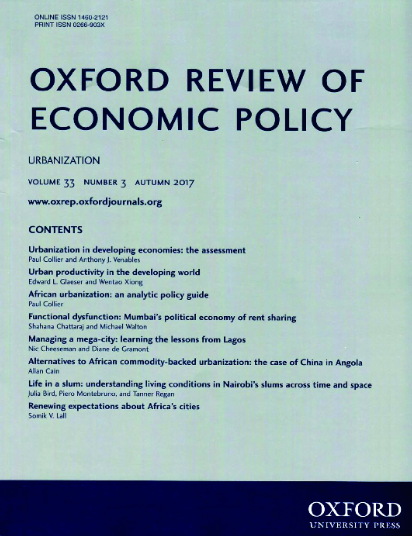创造就业和深度脱碳
IF 2.1
2区 经济学
Q2 ECONOMICS
引用次数: 1
摘要
本文探讨了经济可行性是否是实现深度脱碳或净零排放的关键。经过检验的假设是,民众对脱碳政策的支持是有条件的,因为大多数人相信他们的经济福祉会得到改善,或者至少不会受到这些政策的影响。虽然GDP增长是衡量经济健康状况的典型指标,但衡量气候政策政治可行性的更有用的社会经济指标可能是创造就业机会。具体而言,如果政策制定者在设计和实施气候政策时既考虑创造就业机会,又考虑减排,那么从长远来看,气候政策是否能更成功地实现深度脱碳,本文对现有证据进行了回顾,因为迄今为止,气候政策制定者往往将减排作为政策选择的主要标准。虽然经验证据仍然薄弱,但我们发现,低碳行业创造的就业机会似乎会导致对有助于脱碳的气候政策的更大政治支持,但就业因素并不总是选民决定的最重要因素。我们还发现经验证据表明,清洁能源部署政策,如上网电价补贴,在被研究的国家导致了显著的就业净增长。该报告指出了若干政策含义,包括评估竞争优势、制定计划、设计和执行产业政策以及发展低碳劳动力的必要性。本文章由计算机程序翻译,如有差异,请以英文原文为准。
Job creation and deep decarbonization
This paper explores whether economic viability is the key to achieve deep decarbonization or net zero emissions. The hypothesis tested is that popular support for decarbonization policies is conditional upon most people’s belief that their economic well-being will improve, or at least not suffer with these policies. While GDP growth is the typical metric for economic health, a more useful socio-economic indicator for gauging the political viability of climate policies may be job creation. Specifically, the paper reviews the existing evidence about whether climate policies are more successful in achieving deep decarbonization in the long run if policy-makers include job creation as well as emissions reductions when designing and implementing climate policies, because, to date, climate policy-makers have often focused on emissions reductions as the primary criterion for policy choice. While empirical evidence remains thin, we find that job creation in low-carbon industries appears to lead to greater political support for the climate policies that contribute to decarbonization, but employment factors are not always the most salient factor in a voter’s decision. We also find empirical evidence that clean energy deployment policies, such as feed-in tariffs, have led to significant net gains in employment in the countries that have been studied. The review points to several policy implications, including the need to assess competitive advantage, develop plans, design and execute industrial policy, and develop a low-carbon workforce.
求助全文
通过发布文献求助,成功后即可免费获取论文全文。
去求助
来源期刊

Oxford Review of Economic Policy
ECONOMICS-
CiteScore
12.50
自引率
1.50%
发文量
41
期刊介绍:
The Oxford Review of Economic Policy is a refereed journal which is published quarterly. Each issue concentrates on a current theme in economic policy, with a balance between macro- and microeconomics, and comprises an assessment and a number of articles. It gives a valuable appraisal of economic policies worldwide. While the analysis is challenging and at the forefront of current thinking, articles are presented in non-technical language to make them readily accessible to all readers. The Oxford Review is aimed at a wide audience including government, business and policy-makers, as well as academics and students. It is required reading for those who need to know where research is leading.
 求助内容:
求助内容: 应助结果提醒方式:
应助结果提醒方式:


